Meeting with participants of CCEE Plenary Assembly
- 14
The visit of the high-ranking Catholic clergy to Minsk is recognition of Belarus’ policy of peace and accord, Belarus President Aleksandr Lukashenko said as he met with the participants of the annual Plenary Assembly of the Council of European Bishops’ Conferences (CCEE) on 28 September.
“We believe that the visit of such high-ranking Catholic priests to Minsk is a sign of profound respect for Belarusian Catholic believers. I am convinced that this is recognition of Belarus’ policy of peace and accord in the country and on the international arena,” the head of state said.
“Today Belarus is not just the geographical center of Europe. This is a God’s gift. For many centuries Belarus has been the country where different religions coexist in harmony. Their interaction has had a strong impact on the formation of the Belarusian nation, its cultural and spiritual development.” he remarked.
Aleksandr Lukashenko remarked that the hosting of the CCEE Plenary Assembly in Belarus exactly in this period is very symbolic. This year we celebrate the 500thanniversary of the first old-Belarusian printed book. It was Francysk Skaryna’s Psalter. The work of the printing pioneer made the Gospel more palatable to Eastern Slavonic nations. “Apart from that, this meeting takes place in the year when we mark the 25th anniversary of diplomatic relations between the Republic of Belarus and the Holy See. I am convinced that our cooperation with the Catholic Church will be vigorously developing in the name of peace and creation,” the head of state said.
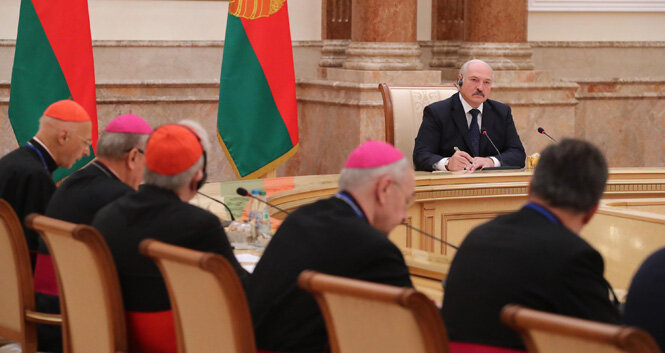
In his words, in contrast to many other corners of the planet the diversity of religions in Belarus has not become a reason for ethnic and religious conflicts. It helps strengthen mutual understanding and respect. “The existing system of conflict-free relations between the state, religion and the society can be and should be an example for other countries,” the Belarusian leader is convinced.
“Belarus realizes the importance of religions in the life of the society. We have established very solid, traditionally strong and, I think, long-lasting traditions of interaction and role of the church in our society,” the President emphasized.
He remarked that, for example, the annual presentation of awards For Spiritual Revival to the clergy, representatives of religious organizations is a testimony to the recognition of their merits. “Realizing the importance of spiritual enlightenment, formation of the moral compass of the Belarusian nation and preservation of its cultural legacy, we provide all-round assistance in the renovation of temples and construction of new churches, jointly implement projects in spiritual and moral education and upbringing of the younger generation,” the head of state said.
Aleksandr Lukashenko expressed confidence that during the visit to Belarus the clergy will feel the kindness and hospitality of Belarusian people. “We do not divide people on religious lines. A person is free to choose a way to church. This is the law of our society. We are trying to recognize grandeur and beauty through friendship, understanding, and patience. Pope Francis, whom I respect immensely, spiritual leaders of virtually all religious denominations are calling for it today,” the Belarusian leader concluded.
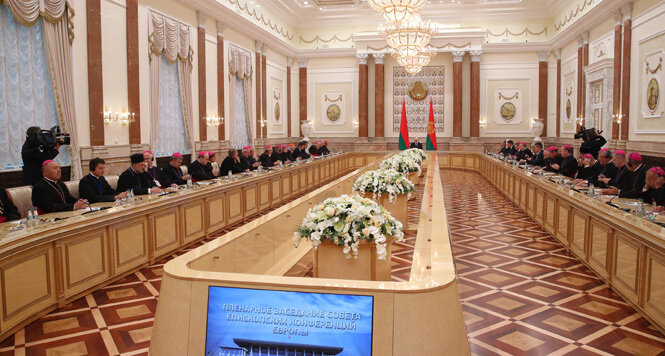
Addressing the participants of the meeting, Aleksandr Lukashenko said that the world is in critical need of an open and trust-based dialogue. “There is no commonness in approaches to handling threats and problems which are of big concern for all of us,” the President said.
In his words, the status of Minsk as an important platform for negotiations is increasing. It is the venue for discussing and passing resolutions on the most serious regional and global problems.
“The today’s conference testifies to the fact that the church, as always, is showing what has to be done to get closer to the resolution of the most serious chronic and new conflicts in the world,” the head of state said. “Your decision to arrive in Minsk and to hold a plenary meeting here was the right one. We appreciate that, it shows once again that Belarus is recognized as a peace-loving and safe state, as the country which can be an example of accord and normal living conditions, where various religions and ethnicities coexist in harmony. We value that. And your conference in Minsk makes us even more responsible as far as the unity of ethnicities and religions is concerned.”
Speaking about the state of affairs in Ukraine, Aleksandr Lukashenko said that Belarus will continue doing its best to help restore peace in this country.
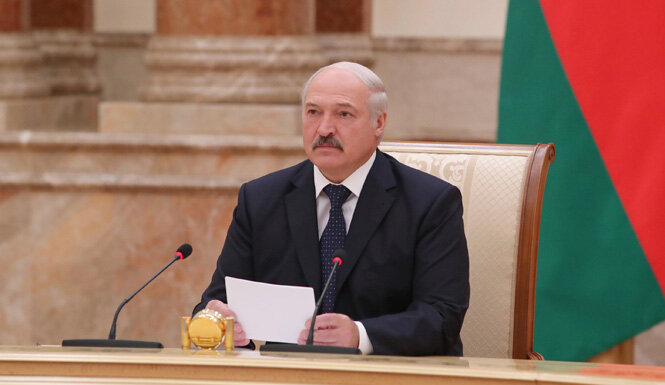
“We could not stand apart when this conflict erupted in southeast Ukraine. We did and will continue doing our best to have the Minsk Accords, which have no alternative today, promote the prompt settlement of peace in Ukraine,” the Belarusian leader said.
“Not long ago we confirmed our position in respect to the war in Ukraine. Our position is not new. I can tell you, the representatives of the most conscientious part of our society, that back then when the conflict just started we suggested European politicians the way out of the situation in order to prevent it from aggravating. European politicians agreed with our proposals, but no steps were made. Today, when thousands of people died, when this conflict turned international, everyone acknowledge that we were right. In fact, today many suggest the variant I voiced at the very beginning,” the head of state said.
“Our inability to put things in order in our own house is a dreadful disaster. It means Europe is suffering from the gravest crisis,” the head of state said.
“We are talking about Ukraine. What is going on in Ukraine is a disaster. But our inability to stop the war is an even greater disaster. We cannot give hope for a future not only to young people of the beautiful country of Ukraine. We also deprive the middle generation and the elder one of every kind of life and hope,” Aleksandr Lukashenko said.
The head of state underlined that in modern conditions the church should speak up and appeal to politicians and statesmen to stop war and bolster security on the European continent unless they want to totally lose Europe. “Hot clashes in Europe are now part of the reality. Brexit is a dangerous precedent that can destroy the European Union,” the Belarusian leader noted.
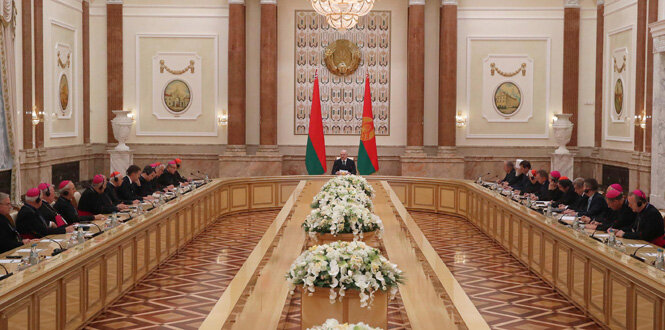
The President noted that he had told the UK Minister of State Alan Duncan that Belarus advocates Europe’s unity and the unity of the European Union in particular. “Because we support a multipolar world while the European Union is one the main pillars of calmness and equilibrium in the world these days,” Aleksandr Lukashenko stated. “If we lose this pillar, if it is destroyed, the world will tilt even more. You know to what effect.”
The President stressed he has no intention of accusing the UK of making a wrong decision. “It is the will of the people of Great Britain. It is up to them to decide what union they want to be part of. Contrariwise, I remember when politicians and state figures — I am even convinced that the British church did it — called for reforming the European Union in order to accommodate many nations, including the UK. But the plea fell on deaf ears in Brussels. Now we are reaping the consequences,” he stated.
“Now all the politicians — new and old ones alike — in Europe are talking about reforming the European Union right now. It needs reform,” the Belarusian leader concluded.
“I am convinced that religious denominations can and should play an important role in the resolution of conflicts, building the dialogue between various nations and states, and uniting people. It is high time for all politicians and statesmen having a strong influence on the peace and security on our planet to hear your persistent voice,” Aleksandr Lukashenko emphasized.
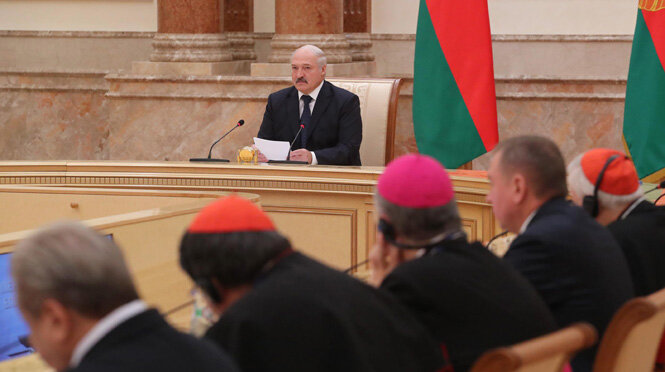
“Today we see that many countries face a spiritual crisis. This threat is more dangerous than all economic challenges. In fact, economic issues have their roots in it. They emerge because of the lack of spirituality. Crisis is in people’s minds. This is the prime cause of all economic crises,” the President said. “Kindness, mercy, love, and faith are the supreme human values which have always served as pillars for people, and they are deteriorating now.”
The head of state remarked that the indigenous population of European countries is growing older, and the birth rate is falling. These negative demographic processes emerge against the backdrop of the moral degradation of the society, weakening of traditional family values, and a massive inflow of migrants. “As a result, all that may lead to tragic consequences, the degeneration of the ancient and important European civilization,” Aleksandr Lukashenko said.
People should not lose the God-given moral compass allowing us to distinguish good from evil,” the President stressed.
“We talked about the results of the meeting between the Pope and Patriarch Kirill, which took place somewhere far away, in Cuba. I think we should consider their meeting here, in Minsk. This is the place where the problems of the West and the East, the North and the South can be discussed,” the Belarusian leader said.

“If you reach the understanding with the Orthodox Church, I and the Belarusian people will do everything necessary for you, your heads and our heads of the Roman Catholic and Orthodox churches to make this meeting in Minsk a historical one. Think about it,” the President said.
I advocate a greater role of the church in the country and worldwide, Aleksandr Lukashenko said. "I know that the church is a conservative institution in the finest sense of this word. Your greatest achievement is that you do not rush for reforms that often lead to the destruction of such institutions. This, however, does not mean we should do nothing. I would like to see the Orthodox and Roman Catholic churches to play a more significant role both in my country and other countries as well. Today we need you more than ever," the Belarusian leader stated.
In his words, the word of the clergy should be eloquent and powerful, which can be not a natural feature of the church. "Today, however, it is necessary. We have such times at present. I wish your voice from this geographical center of Europe to reach not only Europeans, but also all the nations of the world," the President said.
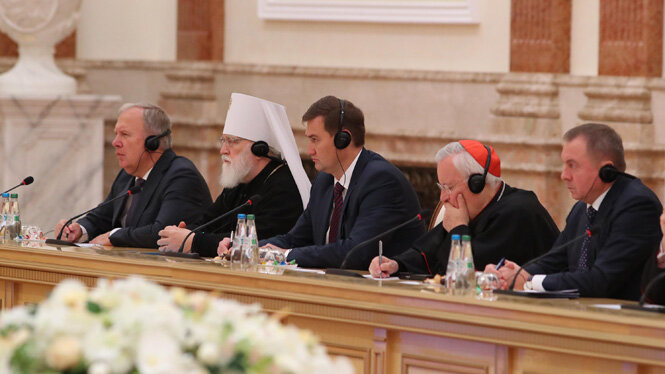
Aleksandr Lukashenko expressed a wish for the churches, both Orthodox and Catholic, to keep up with the times and move towards improvement. "You need to do this in order not to lose people, and have people coming to you for advice, kind word, support, as it was before (and it remains so today). To keep pace with all the good processes on the planet in general and in Europe in particular, we sometimes need a reform, an improvement in our relations and the internal processes in the church," the head of state said.
He noted that one of the participants of the meeting confessed that he feels at home in Belarus. "It is your home. Here there are your believers who love and respect you, value every word of yours," stressed Aleksandr Lukashenko. "The Palace of Independence was visited by different people, but it has never welcomed so many leaders of episcopates. Let this be a good start," the President added.
“All who recognize Belarus as a sovereign and independent country can consider it their home," the Belarusian leader said.
He expressed support of the clergy representatives in their assurance that young people need support: "You are right that you do not see the future for the youth without peace and security in the world, and, first of all, on our European continent, for which both the authorities and the church are responsible for."
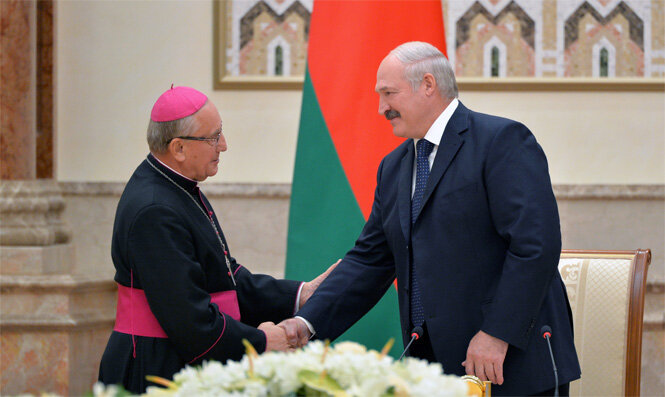
"To talk about the youth today, the prospects of young people, their right to a normal life, their own home, which the representative of Great Britain spoke about here, to talk about the future of young people regardless of how peaceful our continent will be is to make a big mistake. If there is no peace in Europe, there will not be the youth, there will not be our people to follow us. They would be forced to stand on the battlefield with weapons in their hands and look at each other through the aiming sight. This is unacceptable," Aleksandr Lukashenko said.



























